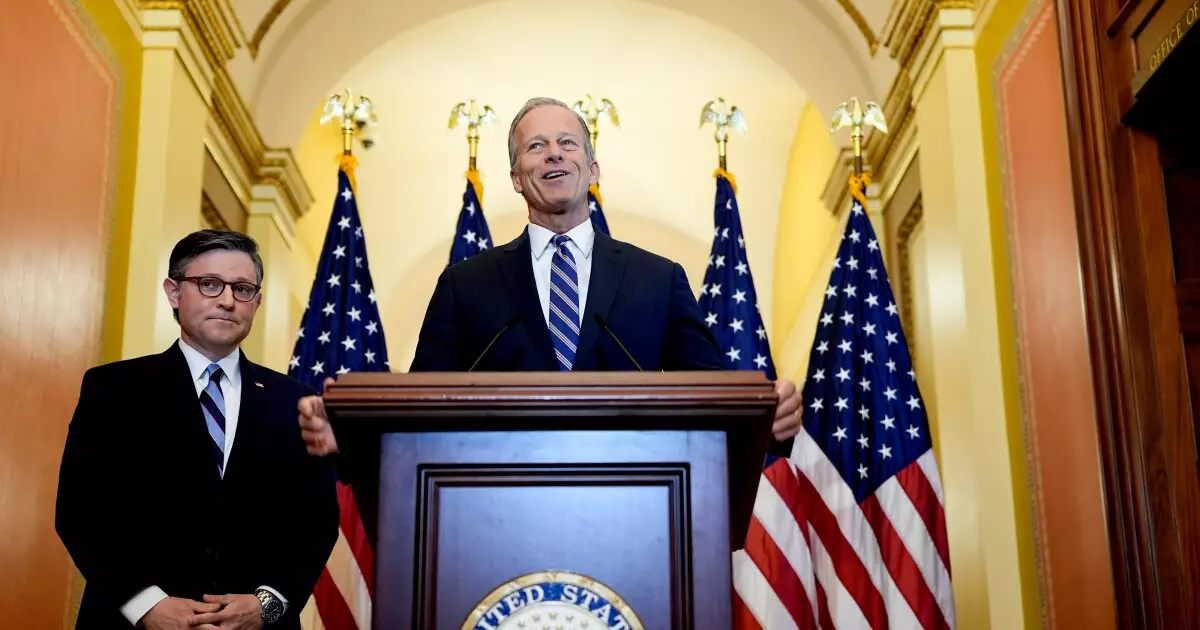This past Thursday marked a significant, albeit precarious, milestone for the Republican leadership with the narrow passage of President Donald Trump’s “big beautiful bill” in the House of Representatives. Winning by a slim margin of 216-214, the accomplishment was less a celebration than a siren call of desperation. Striking deals with a cadre of dissenting lawmakers, Republican leaders moved mountains to push this legislation through, all while some within the party expressed serious reservations about the absence of meaningful spending cuts. As they herald the vote as a victory, it is vital to scrutinize the ramifications of such heavy-handed tactics that may actually compound the very issues they claim to combat.
Unpacking the Budgetary Boondoggle
The bill proposes an expansive $5 trillion price tag, ostensibly to extend the Tax Cuts and Jobs Act, which now hangs like a sword of Damocles over the municipal bonds market. The fear among municipal market participants is palpable: that lawmakers hungry for revenue might target the municipal bond tax exemption, stripping cities of essential financial resources. This could exacerbate the very fiscal dilemmas that conservatives aim to solve.
Moreover, it’s crucial to analyze the rhetoric surrounding “cuts” and perceived efficiency gains. House Speaker Mike Johnson and Senate Majority Leader John Thune tout the goal of trimming at least $1.5 trillion in federal expenses over the next decade, but one must wonder: if this bill is supposedly a launchpad for accountability and drops a monstrous debt burden on future generations, is this truly the path to a more efficient government? To borrow a phrase, “cutting the fat” is one thing, but what about the muscle? Are they strengthening the state or merely pandering to party donors and special interests under the guise of fiscal conservatism?
Dangerous Divide: The House vs. The Senate
The contrasting approaches between the House and Senate have drawn sharp lines, further complicating an already chaotic budgetary landscape. While the Senate’s version calls for only $4 billion in cuts, the House pushes for considerably larger reductions while estimating a staggering allowance of over $5 trillion in tax cuts. This discord indicates not just a divide in ideology but a potential strategy for deception, cloaked in wishful thinking and the allure of tax breaks. The Senate’s current policy baseline model, which includes the zeroing out of costs associated with the TCJA extensions, raises eyebrows about transparency and accountability.
It’s alarming how quickly both chambers seem to embrace creative accounting as some form of problem-solving. Portraying a budget resolution that leads the way to increased spending while presenting it as a victory for fiscal conservatism smacks of hypocrisy. Two dissenters, Rep. Thomas Massie and Rep. Victoria Spartz, have articulated what many within the party are saying privately: this setup seems less like a solution and more like a Pandora’s Box that will invoke unmanageable future deficits.
The Accusation of Irresponsibility
The gravity of neglecting true spending reforms cannot be overstated. There’s an undeniable pattern where political leaders capitalize on tax cuts to win over public sentiment, believing that temporarily alleviating tax burdens will excite their constituents. Yet, in doing so, they gamble away the long-term economic stability for quick wins. This strategy reflects a political recklessness that betrays conservative principles.
The lessons of history dictate that fiscal responsibility must be the bedrock upon which any economic revival should stand. Instead of bold proclamations of progress, Republican leaders seem to be leaning towards half-measures, underestimating the appetite of their conservative base for genuine reform. Questions spiral around whether they possess the political will to back up their promises with substantive actions that limit government spending, especially when the pursuit of power threatens to compromise core values.
Consequences of Compromise: Holding True to Conservative Ideals
As Republicans push forward with this newfound momentum, they must carefully navigate the waters of compromise. They run the risk of alienating their constituents if they fail to deliver meaningful cuts and reforms. If this bill breaks the bank without addressing inefficiencies or waste, it risks being perceived not as a triumph but as an emblem of failed leadership.
In the complex theater of American politics, where every bill passed is perceived through the lens of the upcoming election cycles, Republicans must not only fight to navigate this treacherous landscape but also ensure that they remain true to their foundational conservative ideals—namely, accountability, limited government, and fiscal prudence. As the dust settles, it’s vital to ask if a “big beautiful bill” is truly the best way forward, or just a veiled attempt to disguise deeper failures.


Leave a Reply